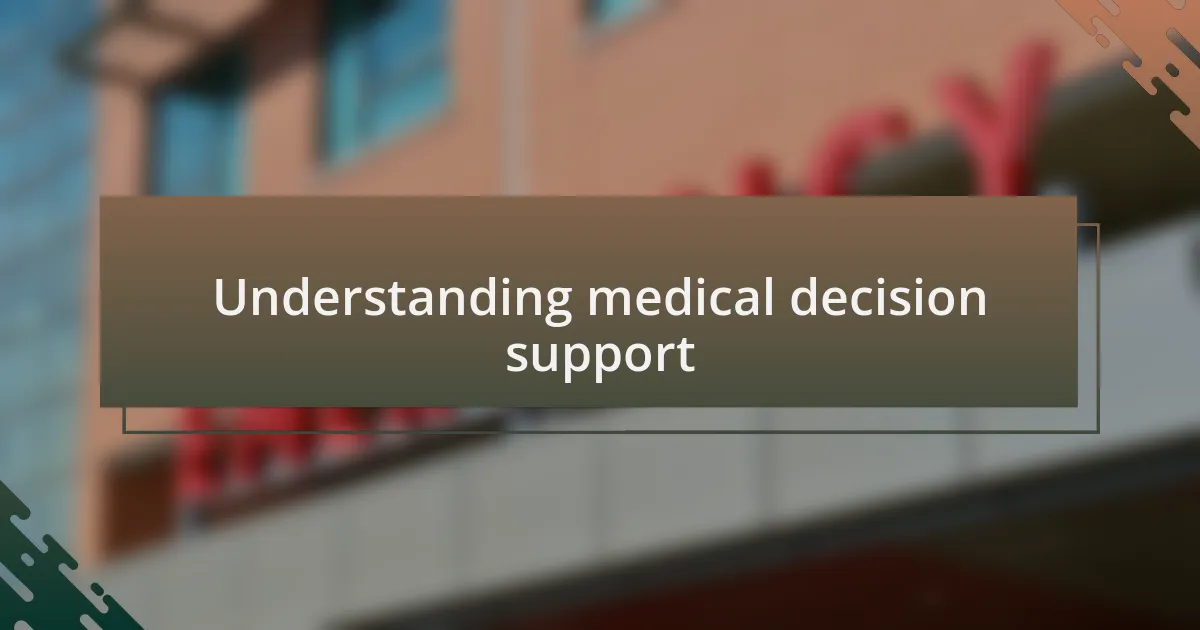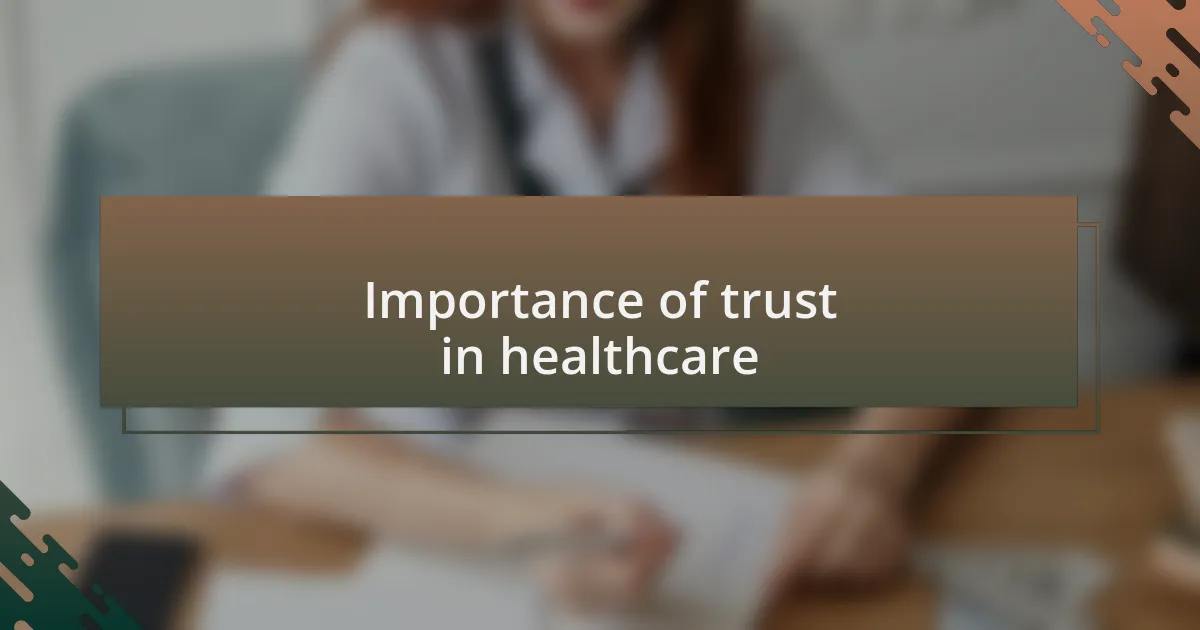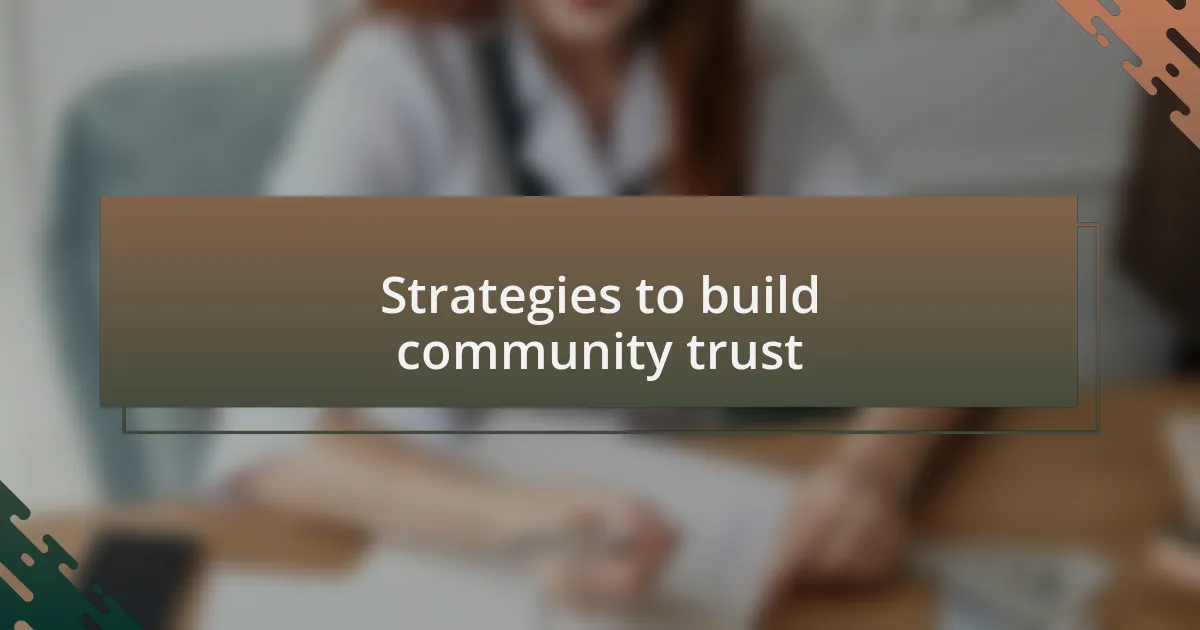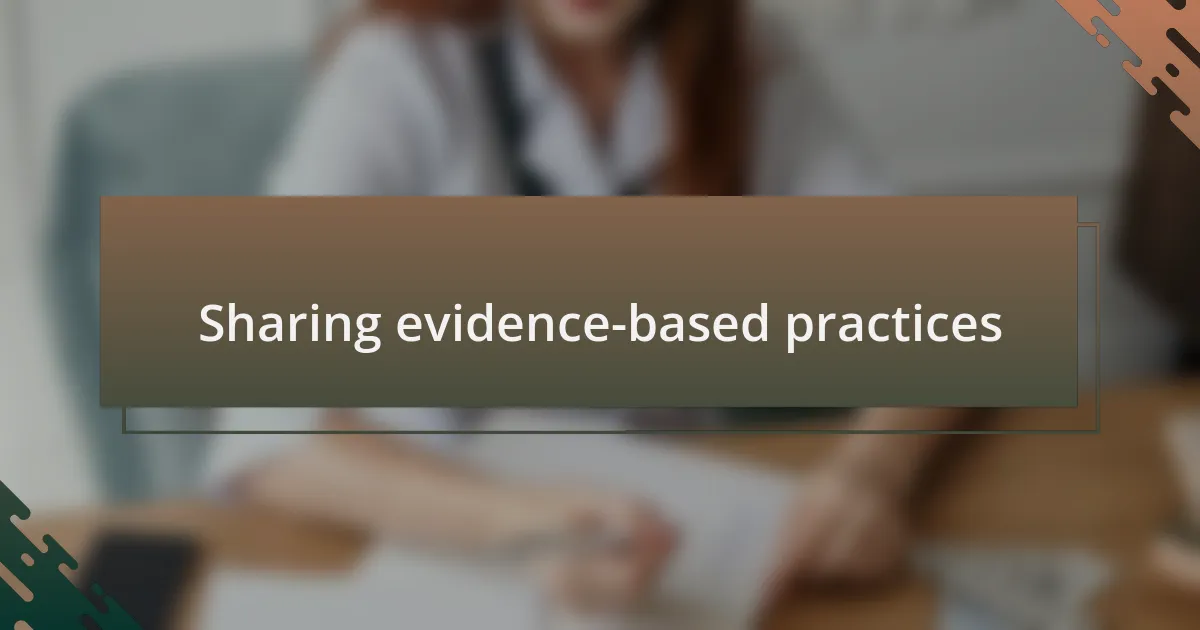Key takeaways:
- Medical decision support systems enhance patient care by helping healthcare providers analyze complex data and make informed choices.
- Trust in healthcare is essential; transparent communication and supportive relationships between patients and providers improve engagement and outcomes.
- Mistrust often arises from historical mistreatment and inconsistent information, making it crucial to rebuild trust through community engagement and clear communication.
- Collaborating with community leaders and presenting evidence-based practices in relatable formats fosters trust and empowers informed health decisions.

Understanding medical decision support
Medical decision support refers to systems designed to assist healthcare providers in making informed choices about patient care. From my experience, these tools help navigate complex medical data, offering insights that might be overlooked during a busy day. Have you ever felt overwhelmed by the sheer volume of information a doctor encounters? That’s where decision support tools can really shine, guiding practitioners toward the best evidence-based practices.
Think about the last time you faced a tough decision regarding a healthcare issue. If a medical professional had a system at their fingertips to analyze symptoms, suggest treatments, and consider patient history all in one go, wouldn’t that enhance their ability to provide optimal care? I’ve seen how such technology can foster confidence in providers, ensuring they feel supported rather than isolated in their decisions.
Moreover, these systems not only aid in decision-making but also promote better communication between patients and healthcare providers. I recall a moment when a doctor used a decision support system to explain potential treatment options to a patient, enhancing the patient’s understanding and involvement in their care. Does this heightened awareness lead to better outcomes? In my view, absolutely. By empowering both providers and patients, medical decision support stands as a cornerstone of modern healthcare.

Importance of trust in healthcare
Trust in healthcare is fundamental for effective patient-provider relationships. I remember a time when a close friend was facing a serious diagnosis. The trust she had in her doctor allowed her to openly discuss her fears and concerns, leading to a more tailored treatment plan. This experience reminded me that when patients believe in the competence and integrity of their healthcare providers, they are more likely to engage actively in their own care.
Establishing trust requires consistent and transparent communication. During my years in the field, I’ve noticed that when healthcare providers take the time to explain procedures and treatment options clearly, it vastly improves patient confidence. Have you ever felt reassured when a physician patiently answered your questions? This kind of validation reinforces a sense of safety, making patients feel like partners in their health journey rather than mere recipients of care.
Moreover, trust can significantly impact health outcomes. I once volunteered in a clinic where many patients were hesitant to follow medical advice due to past experiences of being dismissed or misunderstood. It struck me how crucial it was for those providers to rebuild that lost trust, as it directly influenced whether patients adhered to their treatment plans. In my opinion, trust isn’t just an emotional response; it’s a crucial element that fundamentally shapes the quality of care delivered and received.

Common sources of mistrust
One prevalent source of mistrust in healthcare is the historical mistreatment of marginalized communities. I once attended a community health forum where a participant shared her family’s painful history with medical experimentation. Hearing her story highlighted how deeply entrenched mistrust can stem from generations of abuse. How can we expect individuals to place their faith in a system that has wronged their ancestors?
Another significant factor is the inconsistency in information presented by different health authorities. Early in my career, I experienced this firsthand when discussing vaccines at a local event. Many attendees expressed confusion because they had encountered conflicting messages from various sources. I realized that such contradictions only deepen skepticism, prompting people to question the motives behind health recommendations. Have you ever felt overwhelmed by how much conflicting information exists? It can lead to a “better safe than sorry” mentality, where people hesitate to trust any advice at all.
Additionally, personal experiences with healthcare providers play a critical role in shaping attitudes towards medical evidence. I remember speaking with a friend who had a troubling encounter with a physician who dismissed her symptoms as mere anxiety. That single experience left her feeling invalidated and reluctant to seek help in the future. Can you imagine how difficult it must be for someone to navigate their health when they feel unheard? These negative encounters can create long-lasting barriers, making it harder for individuals to accept recommendations, even when they are based on solid evidence.

Strategies to build community trust
Building community trust requires a proactive approach and genuine engagement. During a local health initiative I participated in, we focused on forming small, diverse discussion groups. Participants could openly share their feelings and experiences regarding healthcare, which fostered a sense of belonging and collaboration. How often do you see forums where voices from the community are truly heard? Creating spaces where people feel safe to express concerns can invite healing and trust.
Another effective strategy involves partnering with trusted community leaders. In one project, we collaborated with local faith leaders who had established relationships within their congregations. Their endorsement played a pivotal role in breaking down barriers and fostering acceptance of health initiatives. After attending several meetings, I noticed how their presence transformed skepticism into dialogue. Have you ever considered how influential local figures can be when it comes to changing perceptions?
Finally, transparency is key. I learned this when our team openly shared the data and methodologies behind our health recommendations during a community workshop. Many participants expressed appreciation for our honesty, even when the results were complex and nuanced. This transparency cultivates respect and encourages individuals to ask questions and engage with the material. Isn’t it refreshing when information is presented honestly, without hidden agendas?

Engaging with community leaders
Engaging with community leaders is a crucial step in rebuilding trust in healthcare initiatives. One memorable experience I had was when I reached out to a local school principal who was respected and adored by families in the area. By inviting her to co-host an informational session, we created a bridge between our project and the parents, turning skepticism into interest. Have you ever felt more assured about a decision when someone you admire was supportive of it?
In another instance, collaborating with a local business owner provided unexpected benefits. His reputation within the community as a fair and generous leader opened doors to conversations that had previously been closed. I remember how his simple endorsement of our health program ignited enthusiasm among community members, prompting them to actively engage. Isn’t it fascinating how the right ambassador can spark collective momentum?
Moreover, building these relationships requires ongoing commitment. I learned this firsthand when we organized regular check-ins with community leaders to discuss not just our progress but also their insights and concerns. This flow of communication not only empowered them to advocate for our initiatives but also made them feel genuinely part of the solution. How often do we miss opportunities to involve those who understand the community best?

Sharing evidence-based practices
Sharing evidence-based practices is an essential part of fostering confidence in healthcare solutions. I recall a workshop where we presented local health data, showing clear benefits from a recent vaccination campaign. It was rewarding to see hesitant parents jot down notes and ask questions, transforming their doubt into curiosity. How often do we overlook the power of clear data in dispelling myths?
In another case, I collaborated with a group of nurses who recounted their firsthand experiences using evidence-based guidelines in patient care. Their stories humanized the data, showcasing its practical applications. Witnessing community members nod along, understanding that these practices had real-life impacts, felt like a breakthrough moment. Isn’t it amazing how personal stories can bridge the gap between statistics and everyday life?
Finally, I learned that presenting evidence in relatable formats can deepen understanding. We turned complex medical research into digestible infographics and neighborhood pamphlets, which made the information more accessible. I still remember the excitement in a community meeting when a resident exclaimed, “This makes it so much easier to understand!” Simplifying evidence can create moments of clarity that empower individuals to make informed health decisions. Have you ever experienced such a lightbulb moment that changed your perspective?